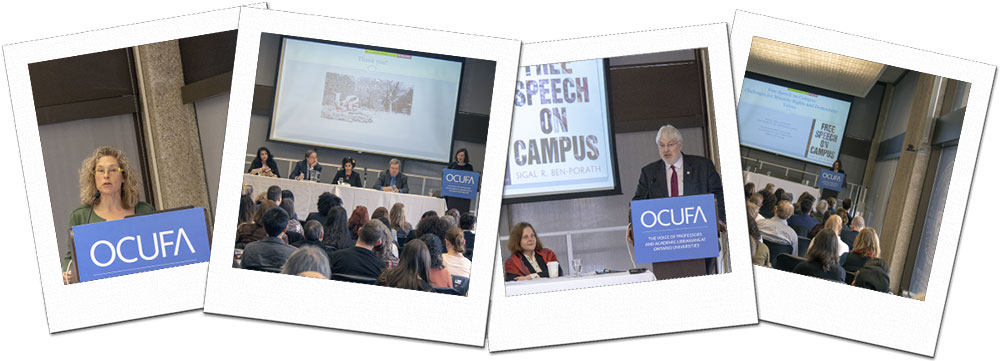
At this year’s Worldviews Lecture, Professor Sigal Ben-Porath addressed the increasingly heightened debate around free speech on campus. Her lecture was followed by a panel discussion that explored challenges for democratic values and minority rights in academia and beyond.
Video of the entire lecture, including the panel discussion, can be viewed online here.
In her lecture, Professor Ben-Porath reflected on campus free speech controversies of recent years – from cancelled speakers to physical fights – and suggests that campuses need to reaffirm their commitment to both free speech and inclusion, with the understanding that both are tightly linked to the academic mission.
Referring to ideas she wrote about in her book, Free Speech on Campus, Professor Ben-Porath presented three levels of the debate for discussion:
Substance: What can be talked about, and are there things that should not be said? Must universities stay neutral regarding campus speakers?
Impact: Are certain views too hurtful to voice? Must they be silenced to avoid negative psychological or social consequences? Are universities considering the impacts of their decisions around these issues?
Public perception: Campus speech debates are often inaccurately portrayed and ineffectively addressed in the media. Open inquiry and the discussion of controversial ideas are an integral part of the academic mission, even if institutional practices could be improved. How can postsecondary institutions ensure the public’s understanding of their work reflects their academic mission?
Professor Ben-Porath argued that universities must become places that protect inclusive freedom, where ideas can be challenged, but where all feel safe to make their opinions heard. She distinguished between intellectual safety and dignitary safety, stating that, while university campuses are places where students should be challenged intellectually, challenging the abilities, rights, or legitimacy of a group of people (particularly those whose voices are already marginalized) actually suppresses speech. Further, she noted that the attempt to weaponize the issue of free speech actually chills speech itself.
Pointing out that debates around speech are not unique to our era, Ben-Porath argued that universities must maintain public standing as institutions that serve the broader community and public interest, not just a small group of loud voices.
She concluded by stating that inclusive campus speech requires understanding:
- the existing norms for disseminating knowledge on campus (the voices and speech currently accepted);
- who is responsible for including people and speech topics;
- the resources available to community members if their expressive or dignitary needs are not being met; and
- how to ensure university campuses are spaces where a productive dialogue can be sustained.

Professor Ben-Porath’s lecture was followed by a panel discussion moderated by Globe and Mail higher education reporter Simona Chiose, and which featured questions from members of the audience and those watching online.
Jasmin Zine, Professor of Sociology and the Muslim Studies Option at Wilfrid Laurier University, observed that allowing white supremacists space on campus to speak legitimizes their views, regardless of attempts by universities to distance themselves from the debate and claim neutrality. She argued that universities must take responsibility for the consequences of that legitimization. Professor Zine spoke of the need to distinguish between controversial speech and hate speech, and to balance speech rights with human rights. She also spoke to the emotional and intellectual labour required to counter intolerant racist and sexist speech – labour that often has to be undertaken by those already struggling to have their voices heard.
Paul Axelrod, author, retired York University professor, and former Dean of York’s Faculty of Education, agreed with Professor Zine that Canadian hate laws should be applied on campus, but that if there are any doubts about the type of speech, we should err on the side of allowing the speech. He discussed the new dimensions of the debate, which has seen increased harassment online. He believes that the values and practices of free expression and inclusivity can and should be reconciled, and that the policies we adopt should reflect these commitments.
Shree Paradkar, a Toronto Star journalist who writes about discrimination and identity issues, pointed out that many of these controversial speakers already have well-establish platforms, and that denying them the right to speak on campus has very little impact on their ability to make their voices heard. She argued that speech rights are far too important to be used to protect bigotry and that human rights should not be up for debate. Paradkar illustrated how free speech advocates don’t come to the defense of all speech, revealing that this debate isn’t necessarily about speech but about ensuring only certain groups have the right to speech.
Scott Jaschik, CEO and Editor of Inside Higher Ed, started by pointing out that speech laws in the United States (where there is less protection against hate speech) are very different than those in Canada, and so comparing developments in both countries can be problematic. He argued that we need to reject the idea that free speech is disappearing from campuses and that, in fact, it continues to thrive. He described how, in the US, the free speech issue is often tied to money and controversial speakers are paid to tour college campuses to promote their views. Without the financial incentive, Jaschik argued these individuals would be far less likely to travel around disseminating their views. He also agreed with Paradkar that free speech defenders seem to be very selective about who they choose to defend. Jaschik concluded by stating that he thinks blocking speech is counterproductive, and actually boosts the notoriety of the speaker, affirming and enabling those who want to sensationalize these issues.
Watch a video of the full lecture and panel discussion.











